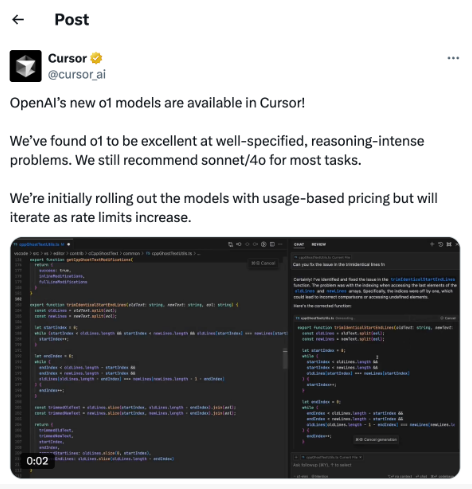Recently, OpenAI has introduced the new generation of o1 models, which are now available on Cursor. These o1 models excel in handling complex and intricate reasoning tasks, exciting many developers.
Particularly noteworthy is the o1-mini model, specifically designed for advanced programming, becoming the new favorite among developers.
Initially, Cursor will adopt a usage-based pricing model. As usage frequency increases, Cursor plans to gradually adjust its pricing structure and optimize model usage restrictions.

Many developers have recently turned their attention to Cursor, with some even choosing to abandon GitHub Copilot in specific scenarios. A developer shared on social media that they created an iOS app in just ten minutes using OpenAI's o1 and Cursor Composer.
It is worth noting that Cursor AI was developed by a team called Anys. This team, founded only two years ago, received $8 million in seed funding from the OpenAI Startup Fund, with participants including former GitHub CEO Nat Friedman and Dropbox co-founder Arash Ferdowsi.
Meanwhile, Microsoft is also actively upgrading the features of VS Code to enhance its competitiveness with Cursor. OpenAI's new models have been integrated into GitHub Copilot, making AI collaborative programming more intelligent.
GitHub CEO Thomas Dohmke shared a video on social media showing GitHub Copilot working with OpenAI's o1 model in VS Code, and he highly praised it, calling it "really amazing."
Additionally, Devin from Cognition Labs has been closely collaborating with OpenAI to evaluate the reasoning capabilities of the o1 model. They found that this series of new models significantly improves the intelligence of code processing systems.
Key Points:
- 🚀 OpenAI's new o1 models are now live on Cursor, showcasing exceptional reasoning abilities.
- 💻 Cursor adopts a usage-based pricing model, attracting more developers.
- 🔥 GitHub Copilot has also integrated the o1 model, enhancing the intelligence of AI collaborative programming.










